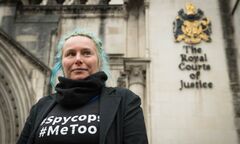Kate Wilson
 | |
Kate Wilson is a political activist who was tricked into a relationship with a man she knew as Mark Stone, but who turned out to be a police spy, Mark Kennedy.[1]
Vindicated
On 30 september 2021, Kate Wilson told The Guardian:
"It is 10 years since I first sat down with a group of eight women to discuss bringing an assault case against the Metropolitan Police. We were reeling from the discoveries that men we had loved never existed. I was tricked into a relationship with a man I knew as Mark Stone, who turned out to be a police spy, Mark Kennedy. The Met had sent serving officers into our lives to deceive us into sexual relationships and to spy on our political campaigns. It quickly emerged that those relationships, which had at first felt like personal betrayals, were in fact part of a systematic practice, spanning decades, of police officers deceiving women into sex and targeting leftwing political organisations in order to undermine dissent."[2]
IPT Judgment
On 30 September 2021, the law firm Freshfields Bruckhaus Deringer reported:
The Investigatory Powers Tribunal – a specialist human rights tribunal that supervises the exercise by authorities of covert surveillance powers in the UK – has today handed down a landmark judgment concerning the undercover policing of protest groups during the late 1990s and 2000s. Freshfields acted pro bono for the claimant – Kate Wilson – at the 7-day substantive hearing of the case in April 2021 and in the preparation of her factual evidence.
The Tribunal has identified a “formidable list” of breaches by the Metropolitan Police of fundamental human rights that invaded the bodily integrity, privacy and political activities of women who were the subject of undercover police surveillance without lawful justification in a democratic society, thereby revealing “disturbing and lamentable failings at the most fundamental levels”.
The claimant’s political activities and personal life were subject to covert surveillance by at least five undercover officers over a period of more than ten years, and she was deceived into a sexual relationship by the undercover officer Mark Kennedy – who she knew as Mark Stone – between November 2003 and February 2005. The Tribunal also heard uncontested evidence that undercover officers deceived many other women into sexual relationships while infiltrating their political activities during the period in issue.
Almost unprecedented in the experience of the Tribunal, the Metropolitan Police conceded that aspects of this conduct amounted to degrading treatment of the claimant contrary to Article 3 of the European Convention of Human Rights (ECHR), a breach of her right to respect for private and family life under Article 8 ECHR, and a breach of her right to freedom of expression under Article 10 ECHR. However, the Metropolitan Police disputed the gravity and extent of the infringement of those rights – particularly as regards the level of knowledge or acquiescence of more senior officers and related failures in training, supervision and safeguarding – and denied any breach of the claimant’s right to freedom of assembly under Article 11 ECHR and freedom from discrimination against women under Article 14 ECHR. The Metropolitan Police also submitted that certain of those matters were more appropriately to be addressed as part of the broader Undercover Policing Inquiry (UCPI), which is a public inquiry that commenced in July 2015 but still remains in its relatively early stages.
The Tribunal considered that it was appropriate to determine all of these matters. It found breaches of Articles 3 and 8 ECHR that were considerably broader than those admitted by the Metropolitan Police, including because senior officers either knew or chose not to know about Kennedy’s sexual relationships with the claimant and adopted something akin to a “don’t ask don’t tell” approach to such relationships; the training of undercover officers in relation to sexual relationships was grossly inadequate; the authorisations for the undercover operations failed to distinguish between domestic extremism potentially involving serious criminality and public order issues and therefore did not meet a pressing social need and were not necessary in a democratic society; and no proper consideration was given or structures were put in place to limit collateral intrusion into the private lives of persons not named as subjects of surveillance.
The Tribunal also found serious breaches by the Metropolitan Police of Articles 10, 11 and 14 ECHR. It concluded that Kennedy took steps to directly influence the claimant’s political opinions and movements, and that the failures of the Metropolitan Police had a disproportionate impact on women in terms of the number of women affected and the greater impact on their lives through the risk of pregnancy or interference with their child-bearing years. The Tribunal also made broader observations about deficiencies falling short of unlawfulness in the statutory surveillance regime that was in place at the relevant time for the UCPI to consider – in the hope that “these events of some years ago are no longer features of policing in this country” – and made important – and in some respects damning – observations regarding the conduct by the Metropolitan Police of this case and its failure to produce factual evidence on matters exclusively within its knowledge.
Freshfields was proud to act pro bono for the claimant in this landmark case, given the gravity of the issues and volume and complexity of the evidence involved. The claimant had originally been represented by Birnberg Peirce, and then had been representing herself as a litigant in person until Freshfields was instructed in January 2021.[3]
Related Document
| Title | Type | Publication date | Author(s) | Description |
|---|---|---|---|---|
| Document:Police Violence | Article | 1 October 2021 | Mike Small | The radical overhaul of how we view policing and law and order shouldn’t be contained within the prism of the appalling problem of male violence – but seen in the context of state violence, the repression of dissent and the growth of the surveillance state. |